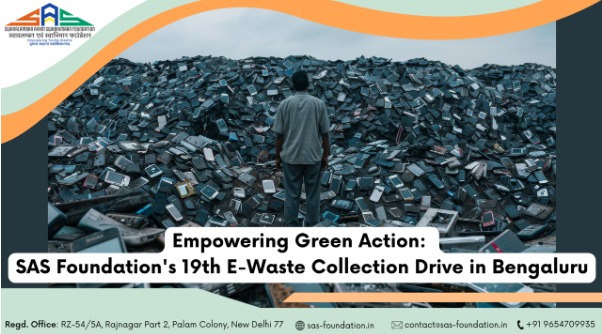The Moral Dilemma of E-Waste: Why Ethical Action Can’t Wait
In a world powered by innovation, we constantly upgrade, refresh, and replace. New phones every two years. Laptops every three. Smartwatches, tablets, headphones—our digital lives expand by the minute. But what happens to the old ones?
Where do the “outdated” and “obsolete” devices go?
They become electronic waste—or e-waste. And this growing mountain of discarded electronics is now posing one of the most complex moral dilemmas of our time:
What do we owe the planet, and each other, when our convenience creates silent suffering?
📱 What Is E-Waste?
E-waste includes everything from mobile phones and laptops to televisions, printers, chargers, routers, and batteries. It’s the fastest-growing waste stream in the world, with over 57 million metric tons generated globally in 2021 alone—and that number is rising steadily.
Most of this waste doesn’t disappear. It ends up in landfills, incinerators, or is shipped to developing countries where it is processed in unsafe, informal conditions.
Behind every discarded device lies a trail of pollution, exploitation, and broken promises.
⚖️ The Ethical Dilemma: Out of Sight, Out of Mind?
Many of us don’t think twice before tossing an old phone in a drawer or handing it off to an unknown recycler. It’s easy to do. Technology moves fast—and we want to keep up.
But here’s the moral cost:
- Human suffering: In countries like Ghana, India, and Nigeria, informal e-waste processing exposes children and adults to toxic chemicals like lead, mercury, and cadmium. They dismantle electronics with bare hands, inhale toxic fumes from burning wires, and suffer long-term health issues.
- Environmental damage: Toxic substances leach into the soil and water, polluting ecosystems and contaminating drinking water sources. What starts as our convenience becomes a long-term ecological tragedy for communities far from where we live.
- Global inequality: Many of the devices we use are produced with precious metals and rare earth elements mined in underdeveloped nations. When we discard electronics without care, we not only waste those resources but also perpetuate cycles of exploitation in extraction and disposal.
These aren’t just environmental or technical challenges—they are deeply moral questions.
🌍 The Hidden Geography of Waste
A phone bought in New York might end up in an e-waste dump in Agbogbloshie, Ghana. A computer discarded in Berlin could be stripped for copper in Delhi’s narrow lanes by a 12-year-old boy.
When we export waste to be “recycled” elsewhere, we are often exporting responsibility—shifting the burden from wealthy consumers to vulnerable communities.
This is not just an injustice. It’s a breach of ethical accountability.
If we benefit from the creation of technology, shouldn’t we also bear responsibility for its end-of-life?
🔄 What Sustainability Truly Means
Sustainability is often talked about in feel-good terms—“green tech,” “zero waste,” “net zero”—but true sustainability begins with hard choices.
It requires:
- Producer responsibility: Companies must design products that last longer, are easier to repair, and fully recyclable. The shift from linear to circular economies is essential—and legislation must enforce it.
- Consumer accountability: As users, we must think before we upgrade, choose repair over replacement when possible, and ensure ethical recycling.
- Policy transformation: Governments must regulate e-waste exports, strengthen collection infrastructure, and support certified recycling programs.
Without these steps, our “sustainable future” is just a slogan—not a reality.
🔍 Rethinking Responsibility
At its core, the e-waste dilemma is about interconnected justice.
It forces us to ask:
- What is the real cost of my convenience?
- Whose health and safety is sacrificed for my upgrade?
- How can I use technology without compromising ethics?
These aren’t comfortable questions—but they are necessary. Because real change only happens when we move from passive awareness to active responsibility.
We can no longer separate our personal tech habits from their global consequences. Whether we act or not, someone somewhere is affected.
📚 Education Is Key
Solving the e-waste crisis requires not just better recycling—but better awareness. That’s why campaigns, digital storytelling, and educational content like LinkedIn carousels and newsletters are vital.
These platforms help uncover hidden truths, inspire action, and create collective momentum toward a more just and sustainable world.
For example, a recent 9-slide carousel by the SAS Foundation highlighted:
- The true cost of fast tech
- The global routes of dumped devices
- The importance of e-waste audits
- Easy tips to act ethically
- Why youth must lead this conversation
It sparked discussion, reflection, and most importantly—commitment to change.
✅ What Can You Do?
Ethical action doesn’t require perfection. It begins with small, intentional steps that ripple outward.
Here are a few you can start with:
- Extend the life of your devices—repair instead of replace.
- Recycle only with certified e-waste handlers (e.g., R2, E-Stewards certified).
- Donate working electronics to trusted refurbishers or nonprofits.
- Avoid tech overconsumption by questioning impulse upgrades.
- Support ethical brands that follow take-back and recycling commitments.
- Educate your network—share articles, host talks, post online.
- Ask hard questions: Does this company disclose its e-waste policies? Is this device designed for disassembly?
The most ethical societies are not those with the most laws—but those with the most engaged citizens.
🔔 Join the Movement
At the Swavalamban Avam Swabhimaan Foundation (SAS Foundation), we believe that digital responsibility is not optional—it’s urgent.
Our programs work to:
- Educate youth about sustainable technology
- Partner with responsible recyclers
- Advocate for policy change and producer responsibility
- Organize community e-waste drives
- Publish stories that move hearts and shift habits
We invite you to subscribe to our newsletter for powerful stories, actionable insights, and updates on how you can become a part of the change.
💬 Final Thought: Ethics in the Age of Innovation
We live in an age where technology defines everything—how we work, connect, and live. But our greatest innovation will not be faster devices. It will be the ability to act ethically with the power we hold in our hands.
E-waste is not just a technical issue—it’s a moral frontier.
Let us face it not with guilt, but with courage, clarity, and commitment. Let us choose action over apathy, justice over ignorance, and sustainability over short-term gain.
Because when we rethink responsibility—we don’t just protect the planet. We protect each other.










